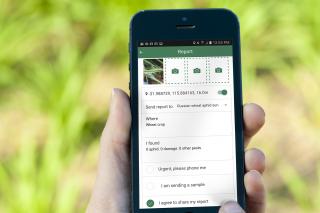Small landholders, particularly those along the Great Eastern Highway corridor, are being asked to survey for a tiny aphid found in the Eastern States, which is a major pest of some grain crops.
Russian wheat aphid (RWA) was recently detected in South Australia and Victoria, which can cause significant yield losses in wheat and barley. RWA has not been detected in WA.
Department of Agriculture and Food Chief Plant Biosecurity Officer John van Schagen said there was a risk that the pest could be brought across the border via vehicle movements.
Mr van Schagen encouraged small landholders, particularly those with properties in close proximity to the highway, to assist department and industry surveillance efforts to detect the pest.
“We would appreciate if landholders with wheat or barley crops or self-sown volunteer plants, as well as those with Poaceae grasses check for signs of aphids and report both the absence and presence of RWA,” he said.
“As it’s difficult to tell the difference between small aphids, it is best to report all aphids and any signs of crop damage, such as streaking, leaf curling and redness, in both wheat and barley crops, as well as weeds, such as wild oats.”
Mr van Schagen stressed that it was imperative that strict biosecurity procedures to prevent the risk of spreading the pest were followed while surveying.
“After inspections, it is best to wash hands and brush down clothes and boots that have been in contact with crops,” he said.
Given the risk of spreading infected plant material, the department would prefer reports to be sent via its MyPestGuide Reporter or PestFax Reporter smartphone apps or online.
For more details about surveying for RWA, on-farm biosecurity and how to report, visit the webpage.

Media contacts: Jodie Thomson/Megan Broad, media liaison 61 (0)8 9368 3937
